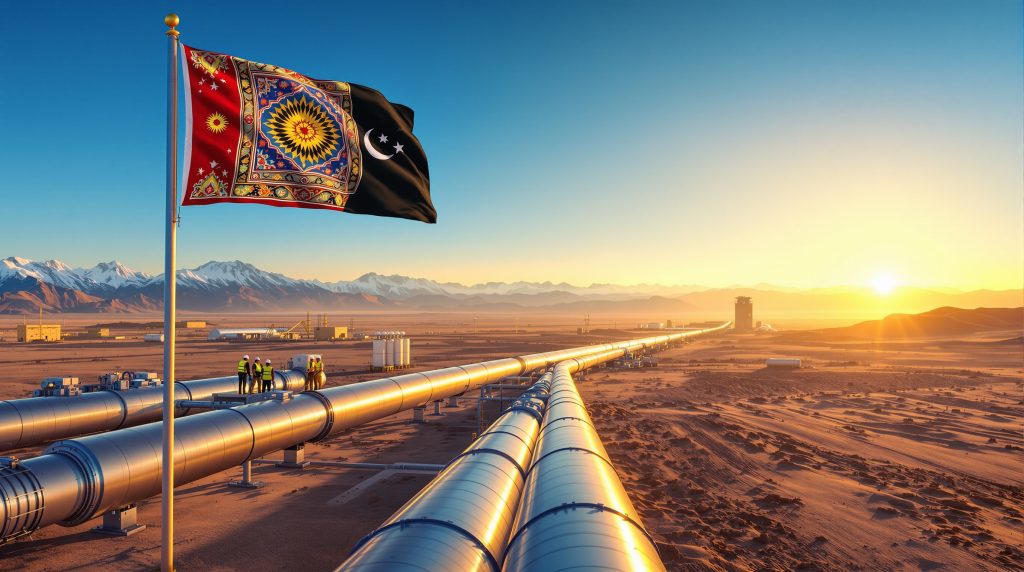Central Asia's Strategic Energy Transformation Through Pragmatic Partnerships
Central Asian energy diplomacy has undergone a fundamental shift toward practical cooperation models that prioritise economic outcomes over traditional geopolitical considerations. This transformation reflects a broader regional strategy where infrastructure development serves as the foundation for diplomatic engagement between nations with historically complex relationships. The evolution demonstrates how large-scale energy projects can create sustainable partnerships that transcend political differences through mutual economic dependencies.
The Turkmenistan pipeline diplomacy with the Taliban exemplifies this new approach, where energy infrastructure becomes a diplomatic tool for regional integration. Rather than allowing ideological barriers to prevent cooperation, both nations have embraced a framework that emphasises shared economic benefits and long-term strategic positioning in global energy markets. Furthermore, this approach aligns with broader energy transition insights that demonstrate how infrastructure partnerships can reshape regional power dynamics.
The TAPI Pipeline's Strategic Significance in Regional Energy Security
The Turkmenistan-Afghanistan-Pakistan-India (TAPI) natural gas pipeline represents far more than conventional energy infrastructure. With its projected annual capacity of 33 billion cubic metres, this corridor could fundamentally reshape South Asian energy security while providing Central Asian producers with essential market diversification opportunities beyond traditional export routes.
Economic Impact Assessment
| Component | Projected Value | Implementation Timeline |
|---|---|---|
| Annual Gas Capacity | 33 billion cubic metres | Post-completion |
| Afghanistan Transit Revenue | $1+ billion annually | Upon full operation |
| Afghan Territory Coverage | 1,800+ kilometres | Multi-phase construction |
| Current Construction Progress | 14 kilometres completed | As of October 2025 |
The project's formal relaunch in September 2024 marked a critical milestone after decades of delays caused by regional instability. The vision, originally conceived during the mid-1990s period of relative calm in Afghanistan, remained dormant throughout the turbulent decades following the September 11 attacks. This revival signals a new pragmatic approach to regional energy cooperation that prioritises economic development over historical grievances. Additionally, the project's success could influence broader oil price dynamics across regional markets.
Technical Specifications and Route Planning:
- Starting point: Serhetabat in Mary Province, southern Turkmenistan
- Primary Afghan destination: Herat Province
- Total pipeline capacity: Designed for sustained high-volume gas transport
- Construction methodology: Phased approach beginning with Turkmenistan-Afghanistan segment
Afghanistan's Strategic Positioning in Regional Energy Flows
Afghanistan's geographic location creates unique leverage in Central Asian energy diplomacy, transforming the country from a perceived security liability into a strategic asset for neighbouring energy producers. The Taliban administration's commitment to pipeline security represents a calculated shift toward economic legitimacy through infrastructure protection and revenue generation.
Revenue Generation Potential
The projected $1+ billion in annual transit fees could provide Afghanistan with sustainable financing for governance structures while creating employment opportunities across multiple provinces. This revenue model offers a practical pathway for economic reconstruction that extends far beyond traditional economic activities, potentially generating income streams that dwarf other sectors of the Afghan economy.
Key Strategic Advantages:
- Direct transit route connecting Central Asian producers to South Asian consumers
- Substantial revenue generation through transit fees
- Employment creation in construction and operational phases
- Enhanced regional diplomatic positioning through energy cooperation
Regional Powers Navigate Complex Partnership Dynamics
The development of Turkmenistan pipeline diplomacy with the Taliban demonstrates sophisticated approaches to energy cooperation that transcend traditional diplomatic constraints. Both nations have adopted frameworks that prioritise economic interdependence while maintaining flexibility regarding broader political relationships. Moreover, these developments occur amidst broader trade war impacts that influence regional energy cooperation strategies.
Turkmenistan's Market Diversification Strategy
Turkmenistan's engagement reflects urgent strategic priorities for export market diversification beyond traditional routes. The country's leadership recognises that dependence on limited export channels creates vulnerability, making the TAPI project essential for long-term energy security and economic stability.
According to official statements from October 2025, bilateral relations between Turkmenistan and Afghanistan have strengthened significantly, with the TAPI project serving as a catalyst for broader cooperation. This partnership extends beyond mere commercial arrangements to encompass mutual support for regional stability and economic development.
Export Diversification Benefits Include:
- Reduced dependence on existing export partnerships
- Direct access to high-demand South Asian energy markets
- Enhanced negotiating position with traditional trading partners
- Long-term revenue stability through diversified market channels
- Improved energy security for both producer and consumer nations
International Support and Recognition
Notably, the project has received acknowledgement from the United States, with Turkmen leadership specifically praising American support for TAPI and broader regional trade initiatives. This international backing suggests recognition of the project's potential for regional stability and economic development, despite ongoing political complexities regarding Taliban governance.
The U.S. position indicates support for infrastructure projects that promote regional connectivity and economic development, even in politically complex environments. This approach reflects a pragmatic understanding that energy cooperation can contribute to regional stability regardless of broader diplomatic challenges. Similarly, strategic initiatives like the critical minerals order demonstrate how governments prioritise energy security through diverse partnerships.
Potential Challenges to Pipeline Diplomacy Success
Despite positive momentum, several factors could impact the long-term viability of Turkmenistan pipeline diplomacy with the Taliban and the broader TAPI project. These challenges span security, financial, and geopolitical dimensions that require careful management and contingency planning.
Security and Operational Risks
Pipeline infrastructure across Afghanistan faces inherent security challenges due to the country's complex security environment. While the Taliban has committed to protecting pipeline infrastructure, ensuring consistent security across 1,800+ kilometres of Afghan territory presents ongoing operational challenges that could affect project timelines and costs.
Critical Risk Assessment:
- Infrastructure protection across extensive Afghan territory
- Coordination between multiple national security frameworks
- Potential for regional conflicts to impact operations
- Technical challenges in harsh geographic conditions
Market and Financial Uncertainties
The project's success depends heavily on downstream market demand and pricing mechanisms that remain subject to regional political and economic fluctuations. Long-term gas purchase agreements require stable relationships between producer and consumer nations, which political tensions could potentially disrupt.
Additionally, international financing for projects involving the Taliban administration presents ongoing complications due to sanctions regimes and recognition issues. Alternative financing mechanisms may be required to complete the substantial infrastructure investments needed for full project implementation.
International Recognition's Impact on Pipeline Development
The complex relationship between international recognition of the Taliban government and energy project financing creates both opportunities and constraints for pipeline development. While some nations pursue pragmatic engagement focused on economic cooperation, others maintain distance due to political considerations.
Pragmatic Engagement Models
Central Asian states have developed practical approaches to cooperation with Afghanistan that enable infrastructure development while maintaining flexibility regarding formal diplomatic recognition. This model allows for substantial economic projects without requiring full political normalisation, creating space for mutually beneficial arrangements.
The approach demonstrates how energy cooperation can proceed through technical and commercial channels even when broader political relationships remain complex. This framework may serve as a template for similar projects across regions experiencing political transitions or diplomatic challenges. For instance, Turkmenistan's pipeline diplomacy showcases how regional partnerships can overcome traditional barriers.
Financing and Development Implications
Western reluctance to engage with Taliban governance creates opportunities for alternative financing mechanisms, particularly from regional powers and non-Western financial institutions. This shift in financing sources could influence project design, implementation timelines, and long-term operational frameworks.
Regional development banks and bilateral financing arrangements may play increasingly important roles in Central Asian energy infrastructure, potentially reducing dependence on traditional international development funding sources.
Economic Transformation Potential from Successful Implementation
Successful completion of the TAPI pipeline could catalyse broader economic transformation across participating nations, extending well beyond direct energy sector impacts. The project's influence on regional economic integration, employment generation, and infrastructure development could create lasting changes in Central and South Asian economic relationships.
Regional Energy Market Restructuring
The pipeline's operation could establish new pricing benchmarks for Central Asian gas exports while creating competitive dynamics that benefit consumer nations. This market restructuring extends beyond bilateral relationships to influence broader regional energy trading patterns and pricing mechanisms.
Potential Market Impacts:
- New competitive pressures on existing supply arrangements
- Enhanced price discovery mechanisms for regional gas markets
- Improved energy security for South Asian consumer nations
- Strengthened bargaining position for Central Asian producers
Employment and Capacity Development
Pipeline construction and operation require substantial skilled labour development, potentially creating training programmes with applications beyond the energy sector. These capacity-building initiatives could generate long-term economic benefits that exceed direct pipeline revenue through human capital development and technical skill acquisition.
The project could serve as a catalyst for broader infrastructure development across the region, creating demonstration effects that encourage additional cross-border cooperation projects and regional integration initiatives. Furthermore, this aligns with emerging trends in green metals leadership where infrastructure partnerships enable sustainable resource development.
Future Regional Cooperation Models
The success of Turkmenistan pipeline diplomacy with the Taliban could establish precedents for similar infrastructure-led diplomatic arrangements across Central Asia. This model emphasises practical cooperation over political alignment, potentially influencing how regional powers approach future development partnerships.
Template for Infrastructure Diplomacy
The TAPI project demonstrates how large-scale infrastructure can serve as a diplomatic bridge, creating stakeholder relationships that transcend traditional political boundaries. This approach may influence future regional development strategies by showing how economic interdependence can provide stability even in politically complex environments.
Key Diplomatic Innovation Elements:
- Economic cooperation preceding political normalisation
- Infrastructure as a foundation for broader partnership development
- Mutual benefit frameworks that reduce ideological barriers
- Flexible engagement models that accommodate political transitions
Regional Integration Implications
Success could encourage additional cross-border infrastructure projects that enhance regional connectivity and economic integration. This ripple effect might include transportation corridors, telecommunications networks, and additional energy infrastructure that builds upon the TAPI foundation.
The project's influence on regional cooperation frameworks could extend beyond energy to encompass trade facilitation, customs cooperation, and broader economic integration initiatives that benefit all participating nations. However, analysts note concerns about the Taliban's ambitious pipeline plans and their practical implementation challenges.
Success Metrics and Evaluation Framework
Measuring the success of Turkmenistan pipeline diplomacy with the Taliban requires both immediate construction milestones and long-term operational indicators. These metrics should encompass technical achievements, economic outcomes, and diplomatic relationship development.
Short-Term Performance Indicators (2025-2027)
- Construction Progress: Achievement of planned construction milestones within projected timelines
- Security Maintenance: Incident frequency along pipeline routes and effectiveness of protection measures
- Stakeholder Engagement: Commitment levels from downstream consumer nations and financing partners
- Technical Implementation: Successful completion of engineering and construction phases
Current progress shows 14 kilometres completed as of October 2025, representing initial phase success but highlighting the substantial work remaining to complete the Afghan segment of over 1,800 kilometres.
Long-Term Sustainability Measures (2027-2035)
- Operational Performance: Actual gas flow volumes compared to projected capacity of 33 billion cubic metres annually
- Revenue Generation: Transit fee collection efficiency and contribution to Afghan government finances
- Market Impact: Regional market share capture by Turkmen gas exports and consumer nation satisfaction
- Infrastructure Expansion: Development of additional regional connections and complementary projects
Strategic Implications for Central Asian Energy Security
The TAPI pipeline represents more than bilateral cooperation between Turkmenistan and Afghanistan; it exemplifies how energy infrastructure can reshape regional power dynamics while establishing new frameworks for diplomatic engagement. The project's outcome will likely influence regional cooperation models for decades to come.
Regional Power Balance Evolution
Success could demonstrate that energy diplomacy operates according to different principles than conventional international relations, prioritising economic interdependence over political alignment. This shift might encourage similar approaches to regional cooperation across Central Asia, potentially reducing tensions and enhancing stability through economic integration.
The project showcases how infrastructure development can create positive-sum outcomes where all participating nations benefit economically, regardless of their broader political relationships or diplomatic standings with third countries.
Long-Term Regional Development Trajectory
The TAPI pipeline's completion could catalyse additional infrastructure projects that enhance regional connectivity and economic integration. This multiplier effect might include complementary energy projects, transportation corridors, and telecommunications networks that build upon the foundation established by successful gas pipeline cooperation.
Investment Considerations: The project demonstrates how energy infrastructure investments can serve multiple strategic purposes simultaneously, including market diversification, revenue generation, diplomatic engagement, and regional stability enhancement.
Future Regional Energy Architecture:
- Enhanced energy security through diversified supply routes
- Improved regional economic integration through infrastructure connectivity
- Strengthened diplomatic relationships through successful cooperation precedents
- Increased regional autonomy in energy planning and development
The evolution of Turkmenistan pipeline diplomacy with the Taliban ultimately represents a broader shift in Central Asian approaches to regional cooperation, where practical economic outcomes take precedence over traditional geopolitical considerations. This transformation could influence energy diplomacy models worldwide, demonstrating how infrastructure projects can serve as bridges between unlikely partners while creating sustainable foundations for long-term regional development.
Want to capitalise on Central Asia's energy transformation opportunities?
Discovery Alert's proprietary Discovery IQ model delivers real-time alerts on significant energy and critical minerals discoveries across ASX-listed companies, helping investors identify actionable opportunities in the evolving global energy landscape. Explore Discovery Alert's dedicated discoveries page to understand how major mineral discoveries have generated substantial returns, then begin your 30-day free trial to secure your market-leading advantage in this dynamic sector.




